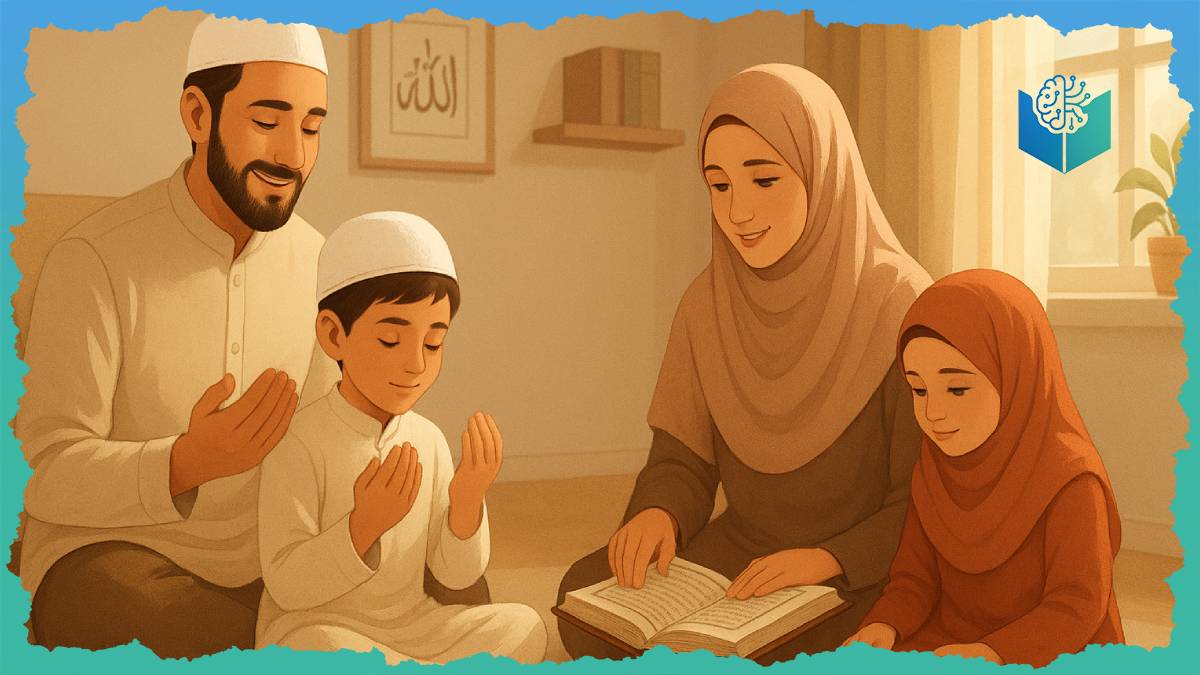Islamic Parenting

Parenting is one of the greatest responsibilities in life, and Islam places a strong emphasis on guiding children with love, wisdom, and values. Islamic parenting is not limited to providing food, clothing, and shelter—it is about nurturing the heart and soul of a child. Through faith, good manners, and moral education, parents raise children who live with dignity, kindness, and devotion to Allah.
For anyone exploring about Islam, parenting is seen as both an act of worship and a trust. The Quran and the teachings of the Prophet Muhammad ﷺ provide timeless principles for raising children with faith and morals that remain relevant in every generation.
The Foundation of Islamic Parenting
At the heart of Islamic parenting is the belief that children are a gift and trust from Allah. Parents are responsible for cultivating faith (iman), good behavior, and strong character. The Quran emphasizes responsibility:
“O you who have believed, protect yourselves and your families from a Fire whose fuel is people and stones.” (Quran 66:6)
This verse reminds parents that nurturing their children’s faith and moral compass is just as important as feeding or educating them. It sets the foundation for what it means to be a lifestyle Muslim—living faith daily and passing it on to the next generation.
Raising Muslim Children with Love and Faith
The process of raising Muslim children begins with love and mercy. The Prophet Muhammad ﷺ was gentle with children, showing affection and treating them with respect. He reminded parents that kindness is not weakness but strength.
Children first learn through imitation. When they see their parents pray, speak kindly, and show gratitude, they naturally mirror these actions. This is why parents who embody faith and humility make the most powerful teachers.
Raising children in Islam is therefore not about harsh discipline but about modeling the values you want them to carry for life.

Parenting Tips in Islam: Practical Steps
To make Islamic parenting practical, the Prophet ﷺ and the Quran provide many simple but effective principles. These can be seen as parenting tips in Islam:
Teach Tawheed (Oneness of Allah) Early
The Prophet Luqman’s advice to his son, recorded in the Quran, begins with teaching belief in Allah:
“O my son, do not associate anything with Allah. Indeed, association with Him is great injustice.” (Quran 31:13)
This shows that faith should be instilled from the earliest years. Teaching children about Allah’s mercy, power, and wisdom helps them build a relationship with their Creator.
Encourage Prayer and Worship
The Prophet ﷺ instructed parents to encourage their children to pray at the age of seven. Prayer becomes a natural part of their routine and identity.
Discipline with Kindness
Islam discourages harsh punishment. Instead, children should be guided with patience, advice, and consistent example. The Prophet ﷺ never struck a child; his way was to inspire, not to intimidate.
Speak with Respect
Even when correcting, the Quran shows us gentle speech as in Luqman’s advice: “O my son…”. Addressing children with dignity fosters trust and love.
Moral Education in Islam
One of the central goals of Islamic parenting is to instill good morals. The Prophet ﷺ said: “The best among you are those who have the best manners.”
Teaching Honesty
Honesty is essential in building trust. Parents should practice truthfulness themselves, since children easily detect contradictions.
Respecting Parents and Elders
The Quran commands respect for parents, reminding children to show gratitude to them alongside gratitude to Allah (Quran 31:14). Teaching children to honor parents also trains them to value authority and relationships.
Compassion and Mercy
From a young age, children should be encouraged to share, help, and care for others. These values prepare them to contribute positively to society.
By making moral education in Islam a priority, parents not only raise good Muslims but also kind, ethical human beings.

The Role of the Quran in Parenting
The Quran is the ultimate guide for parents. It provides stories, wisdom, and practical lessons for raising children. For example:
- The story of Prophet Ibrahim (PBUH) teaching his son about sacrifice shows faith and obedience.
- The advice of Luqman teaches morals, worship, and humility.
- The commands to respect parents emphasize the importance of family ties.
Using the Quran as a parenting guide means parents can always find inspiration, reassurance, and guidance when challenges arise.
Platforms like ayaat.ai make it easier for parents today to access these Quranic stories and lessons, helping them apply divine wisdom in daily parenting.
Creating a Lifestyle Muslim Home
A lifestyle Muslim home is one where faith is lived naturally and joyfully. This means:
- Regular Quran recitation as a family.
- Gratitude at mealtimes, remembering Allah’s blessings.
- Kind speech between parents and children.
- Celebrating Islamic rituals like Ramadan and Eid with enthusiasm.
When Islam is woven into daily routines, children grow up seeing it not as a burden but as a source of happiness and identity.
Challenges in Raising Muslim Children Today
In today’s digital and globalized world, parents face unique challenges in raising Muslim children. Social pressures, distractions, and conflicting values can make it difficult to nurture strong faith.
However, the timeless guidance of the Quran and the Sunnah provide balance:
- Limit harmful influences by setting boundaries.
- Encourage positive friendships and community ties.
- Spend quality family time rooted in faith and open conversation.
By maintaining strong communication, parents can guide children through modern challenges while keeping their hearts attached to Allah.
Balancing Discipline and Mercy
One of the most important parenting tips in Islam is finding the balance between discipline and mercy. Children need structure, but they also need unconditional love.
- Too much harshness creates fear, resentment, or rebellion.
- Too much leniency creates entitlement or lack of discipline.
The Prophet Muhammad ﷺ modeled the perfect balance: correcting mistakes with patience, guiding with wisdom, and always showing love.

The Long-Term Impact of Islamic Parenting
The effort put into Islamic parenting leaves lasting effects. A child raised with love, faith, and morals becomes an adult who:
- Honors Allah through worship.
- Lives with integrity and kindness.
- Serves family and community.
The Prophet ﷺ said: “When a man dies, his deeds come to an end except for three: ongoing charity, knowledge which benefits others, or a righteous child who prays for him.”
This hadith shows that raising righteous children is one of the greatest legacies parents can leave behind.
Parenting as a Journey of Growth
It’s important for parents to remember that raising children is not just about shaping them it’s also about growing themselves. Parents develop patience, wisdom, and reliance on Allah through the journey of Islamic parenting.
Seeking forgiveness when mistakes happen, turning to the Quran for guidance, and praying for children’s success are all part of this journey.
Conclusion
Islamic parenting is a holistic approach that focuses on faith, love, discipline, and moral guidance. It is rooted in the Quran, the teachings of the Prophet ﷺ, and centuries of wisdom passed down in Muslim communities. Through consistent practice, parents can succeed in raising Muslim children who live with faith and good character.
By following practical parenting tips in Islam and focusing on moral education in Islam, families create strong homes filled with love and faith. Building a lifestyle Muslim environment ensures that children see Islam not as a set of rules but as a source of joy, identity, and strength.
For more insights, resources, and Quranic guidance on parenting, visit ayaat.ai, a platform dedicated to helping families understand and live by divine wisdom in everyday life.
Q&A
What is the Islamic parenting style?
The Islamic parenting style is based on love, mercy, guidance, and teaching faith, following the example of the Prophet Muhammad ﷺ. It combines discipline with compassion, focusing on raising children with strong morals, respect, and devotion to Allah.
What is the Islamic way of raising a child?
The Islamic way of raising a child is to nurture them with faith, good manners, and love while teaching the guidance of the Quran and Sunnah. Parents are encouraged to model honesty, kindness, and prayer in daily life.
How to be a good mum in Islam?
To be a good mum in Islam is to raise children with love, patience, and strong faith, guiding them towards the Quran and good character. A mother’s role is honored as one of the highest paths to Paradise.





